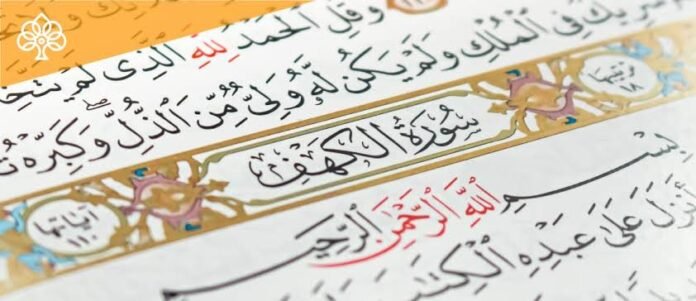According to Ibn Ishaq, Prophet Muhammad’s tribe, the powerful Quraysh, were greatly concerned about their tribesman who had started claiming prophethood and wished to consult rabbis about the matter. The Quraysh sent two men to the rabbis of Medina, reasoning that they had superior knowledge of the scriptures and about the prophets of God. The two Quraysh men described their tribesman, Prophet Muhammad (PBUH), to the rabbis.
The rabbis told the men to ask Muhammad three questions:
They [the rabbis], said, “Ask him about three things which we will tell you to ask, and if he answers them then he is a Prophet who has been sent; if he does not, then he is saying things that are not true, in which case how you will deal with him will be up to you. Ask him about some young men in ancient times, what was their story for theirs is a strange and wondrous tale. Ask him about a man who traveled a great deal and reached the east and the west of the earth. What was his story and ask him about the Ruh (Holy spirit) – what is it? If he tells you about these things, then he is a Prophet, so follow him, but if he does not tell you, then he is a man who is making things up, so deal with him as you see fit.”
However, According to Ibn Ishaq, when Muhammad was informed of the three questions from the rabbis, he said that he would have the answers in the morning but did not say “if God wills it”. For fifteen days, Muhammad waited eagerly for the revelation. Muhammad did not answer the question until then. Doubt in Muhammad began to grow amongst the people of Mecca. Then, after fifteen days, Muhammad received the revelation of al-Kahf, as an answer to the questions.
Allah’s said:
﴿قَالَ قرِينُهُ﴾
(His companion will say), refers to the devil who is entrusted to every man, according to `Abdullah bin `Abbas, Mujahid, Qatadah and several othes. He will say,
﴿رَبَّنَا مَآ أَطْغَيْتُهُ﴾
(Our Lord! I did not push him to transgression,) meaning, the devil will say this about the human who came on the Day of Resurrection as a disbeliever. The devil will disown him, saying,
﴿رَبَّنَا مَآ أَطْغَيْتُهُ﴾
(Our Lord! I did not push him to transgression) meaning, “I did not lead him astray,”
﴿وَلَـكِن كَانَ فِى ضَلَـلٍ بَعِيدٍ﴾
(but he was himself in error far astray.) meaning, he himself was misguided, accepting falsehood and stubborn to the truth. Allah the Exalted and Most Honored said in another Ayah,
﴿وَقَالَ الشَّيْطَـنُ لَمَّا قُضِىَ الاٌّمْرُ إِنَّ اللَّهَ وَعَدَكُمْ وَعْدَ الْحَقِّ وَوَعَدتُّكُمْ فَأَخْلَفْتُكُمْ وَمَا كَانَ لِىَ عَلَيْكُمْ مِّن سُلْطَـنٍ إِلاَّ أَن دَعَوْتُكُمْ فَاسْتَجَبْتُمْ لِى فَلاَ تَلُومُونِى وَلُومُواْ أَنفُسَكُمْ مَّآ أَنَاْ بِمُصْرِخِكُمْ وَمَآ أَنتُمْ بِمُصْرِخِىَّ إِنِّى كَفَرْتُ بِمَآ أَشْرَكْتُمُونِ مِن قَبْلُ إِنَّ الظَّـلِمِينَ لَهُمْ عَذَابٌ أَلِيمٌ ﴾
(And Shaytan will say when the matter has been decided: “Verily, Allah promised you a promise of truth. And I too promised you, but I betrayed you. I had no authority over you except that I called you, and you responded to me. So blame me not, but blame yourselves. I cannot help you, nor can you help me. I deny your former act in associating me as a partner with Allah. Verily, there is a painful torment for the wrongdoers.”) (14:22) Allah the Exalted said,
﴿قَالَ لاَ تَخْتَصِمُواْ لَدَىَّ﴾
((Allah) will say: “Dispute not in front of Me.”) The Lord, the Exalted and Most Honored will say this to the man and his devil companion, who will be disputing before Him. The man will say, “O, Lord! This devil has misguided me away from the Remembrance after it came to me,” while the devil will declare,
﴿رَبَّنَا مَآ أَطْغَيْتُهُ وَلَـكِن كَانَ فِى ضَلَـلٍ بَعِيدٍ﴾
(Our Lord! I did not push him to transgression, but he was himself in error far astray.) from the path of truth. The Lord, the Exalted and Most Honored will say to them,
﴿لاَ تَخْتَصِمُواْ لَدَىَّ﴾
(Dispute not in front of Me,) or `before Me,’
﴿وَقَدْ قَدَّمْتُ إِلَيْكُم بِالْوَعِيدِ﴾
(I had already in advance sent you the threat.) `I have given you sufficient proof by the words of the Messengers, and I have sent down the Divine Books; the evidences, signs and proofs have thus been established against you,’
﴿مَا يُبَدَّلُ الْقَوْلُ لَدَىَّ﴾
(The Sentence that comes from Me cannot be changed, ) “I have made My decision,” according to the explanation of Mujahid,
﴿وَمَآ أَنَاْ بِظَلَّـمٍ لِّلْعَبِيدِ﴾
(And I am not unjust to the servants.) `I will not punish anyone, except on account of their sins after the proof has been established against them.’
Credit: Tafsir Ibn Kathir





